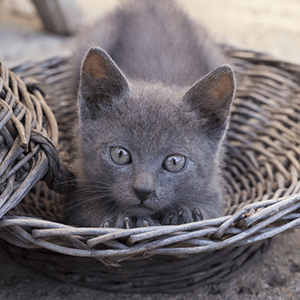Kitten Care Guide
A Guide to Caring for Your Kitten
Kittens are adorable and it's no wonder why kitten videos dominate the internet. Acquiring a kitten is a rewarding and fun experience. Although that ball of fur can be irresistible, they do eventually grow up so make sure that you are thinking about the long-term responsibility and commitment they require and not just caught up in the moment. Many cats can easily live upwards of 16 years plus. At the kitten stage, you will need to do the following:
Kitten Training & Behavior Curbing
The first step is to get a litter box and train your kitten to use the littler box. Most kittens develop a substrate preference early on in age and getting the right litter and litter box can help decrease frustration from litter box training. With so many litter choices, it can be tough to choose the right one for your cat. Most kittens and cats prefer a sand substrate. Clumping litter is also readily acceptable by kittens. If your kitten does not like the litter you get, it may require a little trial and error. Once you find your cat or kittens preferred substrate, stick to it. Some cats will not like it if their litter is changed. The correct box is also very important. Most cats prefer a covered box for privacy. The box should be large enough for your cat to enter and turn around comfortably. There should also be enough litter in the box to provide depth for digging. If you have more than one cat or kitten, always make sure there are more than enough litter boxes as this is the most common cause for inappropriate eliminations issues in cats and kittens. A good rule of thumb is to provide n + 1 litter boxes for the number of cats you have (For example, if you have 2 cats, then there should be at least 3 litter boxes available). The litter boxes should be distributed around private areas in the house and is usually best not place them near their feeding area (nobody wants to eat their dinner next to the toilet!). It is very important to change the litter box regularly or your kitten will attempt to do their business elsewhere.
Feeding Your Kitten the Correct Diet
It is important that your kitten get the right amount and type of nutrients to help them grow healthy. But also remember that while you want your kitten to have all the food needed for a growing cat, over feeding can lead to obesity and feeding them a poor diet can lead to nutrient deficiencies and/or stomach illness. There may be certain foods that are unhealthy for your kitten to eat so check with your veterinarian. Be sure to keep their water bowls full.
Safety - Keep Them out of Danger
Ideally, kittens should be kept indoors. There are many hazards outside such as raccoons, feral adult cats, and neighborhood dogs. Kittens are normally very playful love to climb onto any high furniture or hide in any small crevices. Be sure to keep an eye on them so that they do not inadvertently crawl into an inaccessible crevice or fall from a high shelf. String can also pose a very dangerous hazards if swallowed or they become entangled in it.
Playtime and Activities for Kittens
Cats like to play, but they play differently than dogs. Feather toys, scratching posts/boards, laser toys and balls can to provide adequate playtime and interactivity for most kittens. Things like catnip can also be used to peak their interests.
Immunization as Preventive Care
Immediately after birth, your kitten relies on the immunity protection (antibodies) passed on to them from their mothers. During the first weeks of their lives, they do not have the capabilities to produce their own immunity protection (antibodies) to fight off potentially deadly pathogens such as Feline Distemper (aka Panleukopenia), Rhinotracheitis (Feline upper respiratory disease), Feline Leukemia and Rabies. The antibodies derived from their mothers are not sustainable and as such your kitten is in need of a series of vaccinations and boosters to help protect them from life threatening illnesses. This is why a visit to a veterinarian is so important. Immunization through vaccinations is needed to help prevent or reduce the likelihood of contracting any of these illnesses.
Parasite Screening & Treatment as Preventative Care
Another area of concern for your kitten are parasites. This includes hookworms, roundworms, and coccidia. Most of these parasites are easily detected with a fecal test. Feline leukemia and FIV tests are also important screening tests for your kitten. These viruses can cause severe disease and can be introduced into your household if you have other cats.
What they need the most
Most importantly, don't forget to give your kitten love and care and they will return the favor as they are always happy to see you and to be with you. They sometimes let you work for their attention, but when it comes to loving you back they sure can "Pur" it on. At Parkland Veterinary Hospital in Parkland FL, we take excellent care of your kitten. Ask about our Kitten Package (available with or without spay /neuter). We do your First Kitten Exam FREE, just call 954-757-1729.
